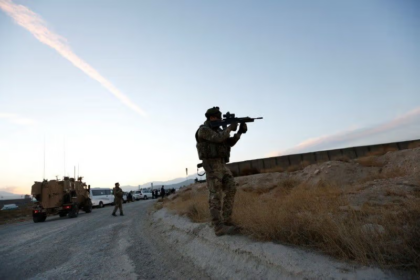RASC News Agency: In a shocking episode that exposes deepening cracks within the Taliban’s internal structure, a cook stationed at a Taliban security outpost in the Shirzad district of Nangarhar Province opened fire on his fellow comrades, killing three and wounding two others. The incident, which occurred around 10:00 AM on Tuesday, April 29, in the Pitlu area, has stunned locals and raised serious questions about discipline, morale, and trust within the group’s rank and file. Local sources informed RASC News Agency that the confrontation began as a verbal dispute between the cook and several Taliban fighters. The altercation escalated rapidly, culminating in the cook seizing a weapon and entering the barracks, where he fired directly at sleeping personnel. The victims all Taliban fighters were caught off guard, resulting in three fatalities and two severe injuries.
The outpost, reportedly managed by the Taliban’s district police command in Shirzad, housed a small contingent of seven individuals, including the attacker. The cook was taken into custody shortly after the incident. However, as of this report, Taliban authorities in Nangarhar have yet to offer a formal explanation or disclose details regarding the motive or background of the assailant. While the Taliban regime frequently boasts of restoring nationwide security since its return to power in August 2021, incidents such as this reflect a far more fractured and volatile reality. Insider attacks of this nature particularly by a non-combatant within such a small, trusted circle signal a dangerous erosion of trust and cohesion among Taliban members.
Analysts warn that the Taliban’s failure to provide adequate governance, fair distribution of resources, or basic services has contributed to widespread disillusionment among its own ranks. The group’s rigid command structure, lack of institutional oversight, and internal purges have bred resentment and suspicion, especially among lower-ranking members who often feel neglected, overworked, and disrespected. This latest act of violence further undermines the Taliban’s already fragile claims to legitimacy and control. It also highlights a deeper crisis brewing beneath the surface of their authoritarian rule a crisis marked by mental distress, factionalism, and crumbling discipline.
International observers note that this incident is part of a broader pattern of growing unrest within Taliban-controlled territories. Despite their promises to ensure stability, the group has consistently failed to address systemic corruption, tribal rivalries, and internal dissent. As the Taliban continue to prioritize ideological control over genuine state-building, the risk of further internal breakdown appears imminent. Unless the group confronts these underlying tensions with transparency and reform an unlikely prospect given their history the frequency and intensity of such incidents may only increase, threatening both their grip on power and the safety of Afghanistan’s already traumatized population.






